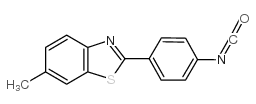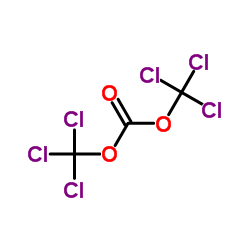4-(6-Methyl-2-benzothiazolyl)phenyl isocyanate

4-(6-Methyl-2-benzothiazolyl)phenyl isocyanate structure
|
Common Name | 4-(6-Methyl-2-benzothiazolyl)phenyl isocyanate | ||
|---|---|---|---|---|
| CAS Number | 67229-93-0 | Molecular Weight | 266.31800 | |
| Density | 1.27g/cm3 | Boiling Point | 419.1ºC at 760 mmHg | |
| Molecular Formula | C15H10N2OS | Melting Point | 140-150ºC (dec.) | |
| MSDS | USA | Flash Point | 207.3ºC | |
| Name | 4-(6-Methyl-2-benzothiazolyl)phenyl isocyanate |
|---|---|
| Synonym | More Synonyms |
| Density | 1.27g/cm3 |
|---|---|
| Boiling Point | 419.1ºC at 760 mmHg |
| Melting Point | 140-150ºC (dec.) |
| Molecular Formula | C15H10N2OS |
| Molecular Weight | 266.31800 |
| Flash Point | 207.3ºC |
| Exact Mass | 266.05100 |
| PSA | 70.56000 |
| LogP | 4.23900 |
| Index of Refraction | 1.676 |
| Storage condition | 2-8°C |
|
Version 1.4
Regulation (EC) No 1907/2006 1 - Product and Company Information Product Name4-(6-METHYL-2-BENZOTHIAZOLYL)PHENYL ISOCYANATE SUITABLE FOR FLUORESCENCE, PURUM, FOR FLUORESCENCE, >= 98.0% (HPLC) 2 - Hazards Identification 3 - Composition/Information on Ingredients Product NameCAS #EC noAnnex I Index Number 4-(6-METHYL-2-BENZOTHIAZOLYL)PHENY 67229-93-0 NoneNone L ISOCYANATE FormulaC15H10N2OS Molecular Weight 266,3000 AMU 4 - First Aid Measures AFTER INHALATION If inhaled, remove to fresh air. If not breathing give artificial respiration. If breathing is difficult, give oxygen. AFTER SKIN CONTACT In case of contact, immediately wash skin with soap and copious amounts of water. AFTER EYE CONTACT In case of contact, immediately flush eyes with copious amounts of water for at least 15 minutes. AFTER INGESTION If swallowed, wash out mouth with water provided person is conscious. Call a physician. 5 - Fire Fighting Measures EXTINGUISHING MEDIA SIGMAwww.molbase.com Suitable: Water spray. Carbon dioxide, dry chemical powder, or appropriate foam. SPECIAL RISKS Specific Hazard(s): Emits toxic fumes under fire conditions. SPECIAL PROTECTIVE EQUIPMENT FOR FIREFIGHTERS Wear self-contained breathing apparatus and protective clothing to prevent contact with skin and eyes. 6 - Accidental Release Measures PERSONAL PRECAUTION PROCEDURES TO BE FOLLOWED IN CASE OF LEAK OR SPILL Evacuate area. PROCEDURE(S) OF PERSONAL PRECAUTION(S) Wear self-contained breathing apparatus, rubber boots, and heavy rubber gloves. METHODS FOR CLEANING UP Sweep up, place in a bag and hold for waste disposal. Avoid raising dust. Ventilate area and wash spill site after material pickup is complete. 7 - Handling and Storage HANDLING Directions for Safe Handling: Do not breathe dust. Do not get in eyes, on skin, on clothing. Avoid prolonged or repeated exposure. STORAGE Conditions of Storage: Keep tightly closed. Store in a cool dry place. Store at 2-8°C 8 - Exposure Controls / Personal Protection ENGINEERING CONTROLS Safety shower and eye bath. Use only in a chemical fume hood. GENERAL HYGIENE MEASURES Wash thoroughly after handling. PERSONAL PROTECTIVE EQUIPMENT Special Protective Measures: Wear appropriate government approved respirator, chemical-resistant gloves, safety goggles, other protective clothing. 9 - Physical and Chemical Properties AppearanceColor: Faintly beige Form: Fine crystals PropertyValueAt Temperature or Pressure pHN/A BP/BP RangeN/A MP/MP Range140,000 °C Flash PointN/A FlammabilityN/A SIGMAwww.molbase.com Autoignition TempN/A Oxidizing Properties N/A Explosive Properties N/A Explosion LimitsN/A Vapor PressureN/A Partition Coefficient N/A ViscosityN/A Vapor DensityN/A Saturated Vapor Conc. N/A Evaporation RateN/A Bulk DensityN/A Decomposition Temp.N/A Solvent ContentN/A Water ContentN/A Surface TensionN/A ConductivityN/A Miscellaneous DataN/A SolubilityN/A 10 - Stability and Reactivity STABILITY Stable: Stable. Conditions to Avoid: Moisture. Materials to Avoid: Strong oxidizing agents. HAZARDOUS DECOMPOSITION PRODUCTS Hazardous Decomposition Products: Carbon monoxide, Carbon dioxide, Nitrogen oxides, Sulfur oxides, Hydrogen cyanide. HAZARDOUS POLYMERIZATION Hazardous Polymerization: Will not occur 11 - Toxicological Information SENSITIZATION Sensitization: Prolonged or repeated exposure may cause allergic reactions in certain sensitive individuals. SIGNS AND SYMPTOMS OF EXPOSURE To the best of our knowledge, the chemical, physical, and toxicological properties have not been thoroughly investigated. Symptoms of exposure may include burning sensation, coughing, wheezing, laryngitis, shortness of breath, headache, nausea, and vomiting. ROUTE OF EXPOSURE Inhalation: Material is irritating to mucous membranes and upper respiratory tract. Multiple Routes: Causes eye and skin irritation. Harmful if swallowed, inhaled, or absorbed through skin. 12 - Ecological Information No data available. 13 - Disposal Considerations SUBSTANCE DISPOSAL Dissolve or mix the material with a combustible solvent and burn SIGMAwww.molbase.com in a chemical incinerator equipped with an afterburner and scrubber. Observe all federal, state, and local environmental regulations. 14 - Transport Information RID/ADR Non-hazardous for road transport. IMDG Non-hazardous for sea transport. IATA Non-hazardous for air transport. 15 - Regulatory Information CLASSIFICATION AND LABELING ACCORDING TO EU DIRECTIVES S-PHRASES: 22-24/25 Do not breathe dust. Avoid contact with skin and eyes. Caution: Substance not yet fully tested (EU). COUNTRY SPECIFIC INFORMATION Germany WGK: 3 Self-Classification 16 - Other Information WARRANTY The above information is believed to be correct but does not purport to be all inclusive and shall be used only as a guide. The information in this document is based on the present state of our knowledge and is applicable to the product with regard to appropriate safety precautions. It does not represent any guarantee of the properties of the product. Inc., shall not be held liable for any damage resulting from handling or from contact with the above product. See reverse side of invoice or packing slip for additional terms and conditions of sale. Copyright 2010 Co. License granted to make unlimitedpaper copies for internal use only. DISCLAIMER For R&D use only. Not for drug, household or other uses. SIGMAwww.molbase.com SECTION 16 - ADDITIONAL INFORMATION N/A |
| Personal Protective Equipment | Eyeshields;Gloves;type N95 (US);type P1 (EN143) respirator filter |
|---|---|
| Safety Phrases | 22-24/25 |
| RIDADR | NONH for all modes of transport |
| WGK Germany | 3 |
| HS Code | 2934200090 |
|
~% 
4-(6-Methyl-2-b... CAS#:67229-93-0 |
| Literature: Biedermann, Frank; Appel, Eric A.; Del Barrio, Jesus; Gruendling, Till; Barner-Kowollik, Christopher; Scherman, Oren A. Macromolecules, 2011 , vol. 44, # 12 p. 4828 - 4835 |
|
~% 
4-(6-Methyl-2-b... CAS#:67229-93-0 |
|
Literature: Weisswange,W. Diss. |
| Precursor 3 | |
|---|---|
| DownStream 0 | |
| HS Code | 2934200090 |
|---|---|
| Summary | 2934200090. other compounds containing in the structure a benzothiazole ring-system (whether or not hydrogenated), not further fused. VAT:17.0%. Tax rebate rate:13.0%. . MFN tariff:6.5%. General tariff:20.0% |
|
R. Wintersteiger et al.
Fresenius J. Anal. Chem. 312 , 455, (1982)
|
|
|
O.S. Wolfbeis, H. Marhold
Monatsh. Chem 114 , 599, (1983)
|
| 2-(4-isocyanatophenyl)-6-methyl-1,3-benzothiazole |
| MFCD00467423 |


